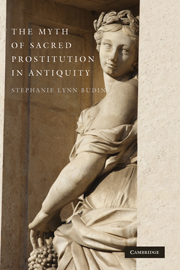Book contents
- Frontmatter
- Contents
- Acknowledgments
- Abbreviations
- THE MYTH OF SACRED PROSTITUTION IN ANTIQUITY
- 1 Introduction
- 2 The Ancient Near Eastern Data
- 3 The So-Called “Evidence”
- 4 Herodotos
- 5 In the Footsteps of Herodotos: Lucian and “Jeremiah”
- 6 Pindar Fragment 122
- 7 Strabo, Confused and Misunderstood
- 8 Klearkhos, Justinus, and Valerius Maximus
- 9 Archaeological “Evidence” from Italy
- 10 The Early Christian Rhetoric
- 11 Last Myths
- Bibliography
- Index
- Index Locorum
10 - The Early Christian Rhetoric
Published online by Cambridge University Press: 18 August 2009
- Frontmatter
- Contents
- Acknowledgments
- Abbreviations
- THE MYTH OF SACRED PROSTITUTION IN ANTIQUITY
- 1 Introduction
- 2 The Ancient Near Eastern Data
- 3 The So-Called “Evidence”
- 4 Herodotos
- 5 In the Footsteps of Herodotos: Lucian and “Jeremiah”
- 6 Pindar Fragment 122
- 7 Strabo, Confused and Misunderstood
- 8 Klearkhos, Justinus, and Valerius Maximus
- 9 Archaeological “Evidence” from Italy
- 10 The Early Christian Rhetoric
- 11 Last Myths
- Bibliography
- Index
- Index Locorum
Summary
Even more numerous than passages from strabo in the historiography of ancient sacred prostitution are the references that appear in the early Christian literature. Although different scholars cite different passages as referring to sacred prostitution, a “complete” list includes no fewer than 10 authors: Paul of Tarsus, Clement of Alexandria, Arnobius of Sicca, Lactantius, Eusebius of Caesaria, Athanasius of Alexandria, Firmicus Maternus, Augustine of Hippo, Sokrates Scholasticus, and Sozomen. Each one of these has been used to support the notion of sacred prostitution existing in one of the regions mentioned previously in this work – St. Paul for Corinth, Clement and Lactantius for Cyprus, Athanasius and Augustine for Phoenicia.
Nevertheless, the evidence derived from the early Christian sources is not entirely credible. Although St. Paul does discuss the problems of pornoi and porneia in the congregation at Corinth, he himself never refers to any links with the local cult of Venus. Furthermore, as recent scholars such as R. Kirchhoff and K. Gaca have discussed, Paul's definition(s) of the terms pornos and porneia are quite distinct from the traditional pagan (and modern) meanings, and thus must be categorized and studied differently.
Then there is the biased nature of the writings. With the (slight) exception of Eusebius and his “followers” Sokrates and Sozomen, who were composing church histories, each of the remaining texts supposedly referring to sacred prostitution is accusational, ranging in genre from apologetic, as with Lactantius, to polemic, as with Firmicus Maternus.
- Type
- Chapter
- Information
- The Myth of Sacred Prostitution in Antiquity , pp. 260 - 286Publisher: Cambridge University PressPrint publication year: 2008



